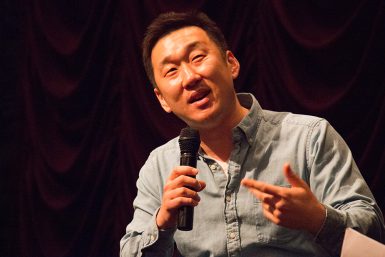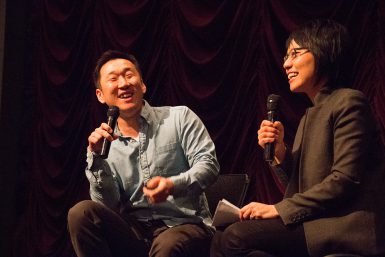Pak explains process, storytelling during IU Cinema event

Ougie Pak said tries his best to follow two hard and fast rules in filmmaking. Don’t work with animals, and don’t work with children.
He fully realized the latter filming a father and son duo on his film Boardwalk.
“The kid would call cut and run away from the set, “ Pak said. “I had to have a kid wrangler.”
Visiting lecturer Ougie Pak also is a filmmaker and writer whose three films were shown Thursday at IU Cinema as part of “Movement: Asian Pacific American Films,” IU’s celebration of Asian Pacific American Heritage Month.
Boardwalk follows the story of a Korean immigrant with a gambling problem who takes his son on a trip to a boardwalk in Atlantic City, New Jersey. The child slowly sees his father’s gambling problem come to light, although he likely doesn’t understand it completely.
“It’s not autobiographical, but it’s definitely inspired,” Pak said, by “severely autobiographical elements, real events, real people, especially men in my family.”
A graduate of the University of California, Berkeley, where he majored in English literature, Pak worked as a development associate at Antidote Films, where he aided the development of several award-winning independent movies, including The Kids Are All Right, Mysterious Skin and Roman Polanski: Wanted and Desired.
His own work has been screened in the Tribeca Film Festival; the Pusan International Film Festival in South Korea, which is the largest festival in Asia; and the Student Academy Awards. He has received awards from the National Board of Review and the South Korean Ministry of Culture, where he served as the 2008-2009 Resident Fellow at the Korean Academy of Film Arts.
Filmmaking wasn’t always on his horizon, he told his audience after the film screening.

“Growing up in an immigrant household, you never think about going into any creative endeavor, you think you’ll just get a job,” Pak said. “You get informed in life, and life becomes your art.”
Pak came to IU in 2013 with his wife after a decade of living in New York City and started teaching film production. After a year in Bloomington, he started production on Boardwalk.
“The casting was really hard,” Pak said, because finding Korean-speaking actors was a challenge. “I don’t know if any of you are filmmakers, but if you’re looking to cast middle aged immigrants, it’s not happening. It’s because they all work. The last thing they ever want to do is act in a film.”
Ellen Wu, the director of the Asian American Studies Program at IU and an associate professor in history, assisted Pak in the production of the film and hosted the talk with Pak.
“When I first think of immigrants, I think of my parents, so the actors seem younger than what I think of,” Wu said. “But I was also surprised the entire film was in Korean.”
The film is subtitled in English, with a few moments when the actors speak a few numbers in English.
“I spoke a sort of ‘Kanglish’ with my family,” Pak said, referring to a portmanteau of Korean and English. “But the actors spoke that naturally during filming.”
The film was shot over the course of four days last summer and produced over the rest of the year in Bloomington.
“We only had five people on the crew,” Pak said, which made catching the unruly child actor on set difficult. “It became hide and seek.”
Apart from the antics of production, Pak said his films are more somber than cheery, and they reflect realities of Asian Americans living in the United States.
“The film represents the day in the life of a kid with his father, who may not even know his father that well,” Pak said. “He’s probably never gone on a trip with his father, but in the end it’ll end up being a day he remembers.”
Pak’s first short film, The 100% Perfect Girl, also was shown. It follows two young lovers who meet, decide to leave one another after a brief encounter to test their love, but never meet again.
Pak’s short film Panopticon is a subtle psychological thriller about a woman who receives videos of herself taken by a stalker.
Although Pak makes movies that aren’t about Asian Americans, he said he considers himself an Asian American filmmaker.
“I wanted him to be Korean because I felt I knew the character,” Pak said of the father in Boardwalk. “He didn’t just happen to be Korean.”

